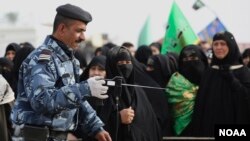Iraq's top Sunni religious, political and tribal leaders met in the Kurdish regional capital Irbil Thursday to denounce Islamic State terrorists and call for the formation of a National Guard to help combat them.
The Iraqi Sunni leaders met to discuss a common defense strategy against invading Islamic State militants, pleading for unity in the face of a dire threat. One political leader dubbed the Islamic State the “Mongol invaders of our era.”
Iraqi Sunni Vice President Osama Nujeify was the keynote speaker at the conference, urging the approval of a National Guard to combat the Islamic State.
He said the international community is sympathetic to the plight of ordinary Iraqis, and that he and other leaders are looking to the international coalition to help set up a National Guard force to represent various regions. He insisted the force will not be sectarian and that it will not pose a threat to the unity of the country.
Sunni politician Hekmat Suleiman said the “suffering of our women and children is forcing us to exert the ultimate effort to relieve them of these horrors.”
Reports of Islamic State brutality in both Iraq and Syria have been widespread. Unconfirmed reports say the Sunni extremists have executed more than 750 members of the Albunemr tribe near the Anbar town of Hit.
A report Thursday claimed the militants had killed several hundred members of the Sheitat tribe near the Iraqi-Syrian border, burying them in a mass grave.
Sectariansim derided
Member of Parliament Mohammed Mashhadani told the conference the forces of division in Iraq are strong, but that sectarianism is not the wave of the future.
He asked, "Who will profit from the division of Iraq into Sunni, Shi'ite and Kurdish regions?" He argued that sectarianism is a practice but not a philosophy, and that all religions have their extremists. Sectarianism is backwards, he insisted, and a force of ignorance.
Ninevah province secretary general Faris Sinjary told the gathering that defenders of a united Iraq and the government “need arms and help from neighboring states to fight the battle against Islamic State terrorists, as well as to rebuild their tattered nation.”
Iraqi Prime Minister Haidar al Abadi, who held a joint press conference Thursday in Baghdad with visiting Jordanian Prime Minister Abdullah Nsour, thanked the Hashemite Kingdom for volunteering to train Iraqi security forces.
He said that security is important to the government and that Jordan is offering its help to train 64,000 members of Iraq's security forces.
Unpredictable outcome
Several Sunni members of parliament lashed out against sectarian Shi'ite militias, which they claimed are alienating many ordinary Sunnis in the country. MP Sha'alan Krayem of Sala'edin Province insisted that “evil [Shi'ite militiamen] have done awful things, like burning houses, burning fields and attacking mosques." He argued that "many of them are just as bad as [the Islamic State militants].”
Analyst James Denselow of the Foreign Policy Center in London told VOA that in theory, the new plan to fight the Islamic State in Iraq appears ironclad, but that it is notoriously difficult to predict the outcome.
"I think what the battle of ISIS and the emergence of ISIS has taught those who have been looking at Iraq, even closely, is that it is incredibly unpredictable because of the weakness of the state," he said.
"So, in theory, the Abadi and the Obama plan around an inclusive Iraq, albeit one in which power is far more federalized or localized as the way forward," Denselow continued. "But, there's a lot of blood that has been spilled, a lot of trust has been lost, a huge amount of brutality has been reaped upon the population and that means that it's a very fragile edifice [on] which to build anything."
A number of top Sunni leaders, including Parliament Speaker Selim al Jabouri, did not attend the meeting. Jabouri did not give a reason. Governor of Sala'edin Province, Raed Ibrahim al Jabouri, indicated he would not attend because of what he said was the “presence of people connected with terrorism,” at the parlay.




